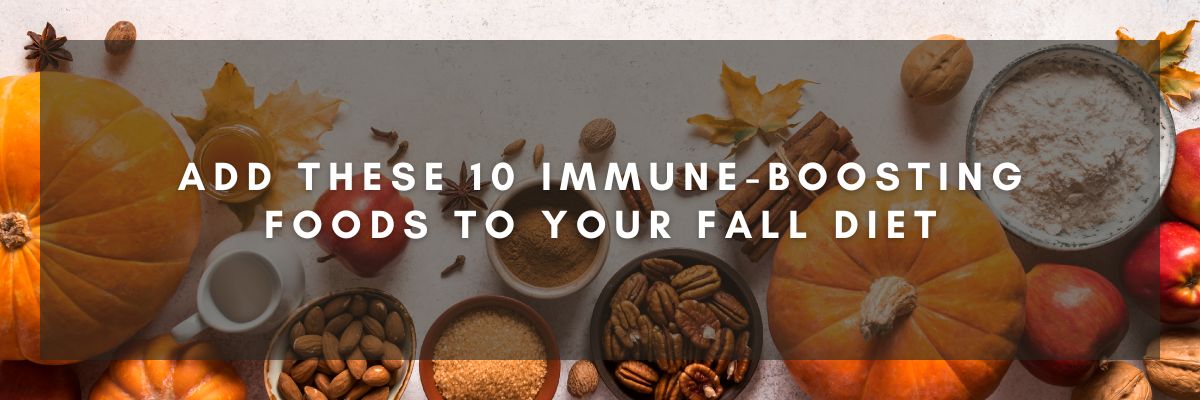
As the leaves change color and temperatures drop, fall brings with it the start of cold and flu season. Supporting your immune system with nutrient-rich foods is one of the best ways to stay healthy during this transitional time. Fortunately, autumn’s bounty offers a wide variety of foods that not only taste great but also enhance immune function. Here are ten immune-boosting foods to incorporate into your fall diet:
Pumpkin
Rich in beta-carotene, which the body converts into vitamin A, pumpkin helps strengthen the immune system and supports healthy skin and eyes. Add pumpkin puree to soups, oatmeal, or smoothies for a nutritional boost. Pumpkin seeds, or pepitas, are also a great source of zinc and healthy fats, further supporting immune health.
Sweet Potatoes
Similar to pumpkin, sweet potatoes are high in beta-carotene and fiber. They help support gut health, which is closely linked to immunity. Roasted sweet potatoes make a delicious side dish or salad topper. Try mashing them with a bit of cinnamon and nutmeg for a warming, comforting dish.
Apples
The old adage “an apple a day keeps the doctor away” has merit. Apples are rich in antioxidants, particularly quercetin, which can help regulate the immune response and reduce inflammation. Eating apples with the skin on provides additional fiber and polyphenols that support a healthy gut microbiome.
Garlic
Garlic is well-known for its immune-boosting properties. It contains allicin, a compound with antimicrobial properties. Adding fresh garlic to your meals can help your body fight off infections. Raw garlic, when chopped and allowed to sit for 10 minutes before use, offers the most potent health benefits.
Ginger
Ginger has powerful anti-inflammatory and antioxidant effects. It’s known to combat nausea and may help prevent illness. Enjoy it in tea, soups, or stir-fries. Ginger can also aid digestion and circulation, making it a perfect addition to your fall wellness routine.
Cranberries
These tart berries are packed with vitamin C and other antioxidants. They help protect cells from damage and support a healthy urinary tract, which plays a role in overall immune function. Choose unsweetened cranberries or make your own cranberry sauce using natural sweeteners like maple syrup or honey.
Brussels Sprouts
A cruciferous vegetable high in vitamins C and K, Brussels sprouts also contain antioxidants that help protect against cellular damage. Try roasting them with olive oil and a touch of balsamic glaze. They’re also high in fiber and contain compounds that support liver detoxification.
Mushrooms
Certain mushrooms, like shiitake and maitake, contain beta-glucans and other compounds that enhance immune activity. Sauté them or add to soups and stews. Mushrooms are also a source of vitamin D, especially if they’re exposed to sunlight during growth, which helps modulate the immune system.
Carrots
Carrots are another great source of beta-carotene and fiber. They’re easy to include in both sweet and savory dishes, such as roasted veggie medleys or baked goods. Carrots also support eye health and contribute to a glowing complexion during the dry fall months.
Pomegranates
These jewel-toned fruits are rich in antioxidants and vitamin C. Their anti-inflammatory properties support heart and immune health. Enjoy the seeds on salads, yogurt, or simply by the handful. Pomegranate juice is also a refreshing and healthful drink option, but opt for unsweetened varieties.
Bonus Tips to Maximize Immune Support Through Diet
- Diversify Your Plate: Incorporating a wide range of colors and foods increases the variety of nutrients and antioxidants your body receives. The more diversity in your meals, the better your immune system will be equipped to respond to invaders.
- Stay Hydrated: Drinking enough water is essential for every function in the body, including immune responses. Herbal teas, broths, and water-rich fruits and vegetables can contribute to your fluid intake.
- Use Spices Liberally: Fall spices like turmeric, cinnamon, and cloves have their own immune-supportive properties. Turmeric is known for its anti-inflammatory effects, especially when paired with black pepper to enhance absorption.
- Probiotics and Fermented Foods: Your gut is home to a large portion of your immune cells. Eating fermented foods like yogurt, kefir, sauerkraut, and miso helps populate your gut with beneficial bacteria that support immune regulation and pathogen defense.
- Cook at Home When Possible: Preparing meals at home allows you to use whole, unprocessed ingredients and avoid excess sugar and preservatives, which can negatively impact immune function. Batch-cooking soups and stews with several of the foods mentioned above can be a simple way to eat nutritiously all week long.
Sample Fall Meal Plan for Immune Support
- Breakfast: Pumpkin oatmeal topped with pomegranate seeds and a sprinkle of cinnamon.
- Lunch: Roasted sweet potato and Brussels sprout bowl with quinoa, garlic tahini dressing, and sautéed mushrooms.
- Snack: Apple slices with almond butter and a few raw carrot sticks.
- Dinner: Ginger-garlic lentil soup with a side of cranberry kale salad.
- Dessert: Baked apples with a touch of honey, cinnamon, and crushed walnuts.
Taking a proactive approach to immune health in the fall can help you stay energized, healthy, and resilient. By focusing on seasonal, nutrient-dense foods, you not only support your body’s defense system but also celebrate the flavors and warmth of the season. Whether you’re sipping ginger tea on a chilly morning or enjoying a hearty vegetable stew in the evening, your food choices can be both comforting and powerful in promoting wellness.




